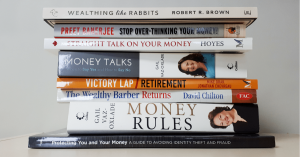It seems crazy, but in just a few short months I will be 30 (30 is the new 20, right?!). The last decade included many of the biggest moments in my life – graduating from college, getting married, and the birth of my daughter to name just a few.
But over the last 10 years, my financial life began to take shape as well. I paid off my student loans, started investing, and began my journey towards financial independence. It wasn’t always easy and I continue to make mistakes a long the way – but during this time, I learned a few things that I believe can make a big difference for someone currently in their 20s (or really any one beginning on their financial journey).
Below are a few of the most important things I learned.
5 Money Moves to Make in Your 20s
1.) Invest in your 401k
What is the best decision I made when I started my first job out of college? I started saving 10% of my income into my 401k as soon as I was eligible. Why? Because saving into a 401k is by far the easiest way to save there is. Since employers automatically deduct and submit your money each pay period, the money never hit my bank account. Right off the bat, I hide money from myself and put it to work.
And guess what? I didn’t even have an employer match!
By investing into your 401k as soon as you can (and leaving it alone!), you get to capture the benefit of compound interest over a long time frame.
Money Move: Start investing in your 401k as soon as possible, even if you don’t have an employer match or what you think are good investment options. Investing in a 401k is one of the easiest investment decisions you can make because you take temptation to spend the money out of the picture. If it never hits your bank account, you can’t spend it!

2.) Establish an Emergency Fund
There are few guarantees in life but one thing you can count on is that at some point, someone will go wrong.
Your car breaks down.
You lose your job.
The Brewers make the World Series and you don’t have a ticket.
These are the times that having money set aside will bail you out of a tough spot.
I am a big believer in having 3-6 months of expenses set aside in case something goes wrong. The peace of mind you get from having that money in cash in case something happens cannot be understated. We all have enough things that add stress to our lives, don’t let unexpected expenses be one of those things.
Money Move: Establish an emergency fund with enough money in it to give you peace of mind that you will be okay if a big expense pops up or something goes wrong (I recommend 3-6 months).
3.) Pay Off All Your Non-Mortgage Debt
Debt is crippling – especially given the insane growth of student loan debt. According to a report by the Wall Street Journal, the average debt load of a 2016 graduate grew to an average of $37k. Shit.
Debt eats up your monthly cash flow, keeps your fixed costs high, and decreases the amount you can save. Instead of putting your money to work towards your goals – you become a slave to your debt. So what can you do about it?
Pay it off as quickly as possible.
If you have debt, especially if the interest rate is greater than 4-6%, you should have few other priorities (excluding the above two items).
When you have debt, it owns you. Debt holds you hostage. Don’t let debt control you life.
Money Move: List all non-mortgage debt in order of highest interest rate to lowest. Pay as much as you can in extra payments on the top debt on the list, while paying the minimums on all the others. Once one is paid off, move on down the list until they are gone.
4.) Gain an Understanding of Personal Finance
As much as people may want to deny it, money is incredibly important in our lives. It is the tool that helps us do the things we want to do. Without it, we are sure to have additional stress and struggles.
The fact that many people choose to not learn even the basics of money is mind blowing to me. People spend hours watching reality TV, playing video games, or complaining about things they have no control over, things that bring little to no value to their life, but they refuse to learn how to pick a fund in their 401k or read a book on how to create a budget.
Money is important and resources to learn about it are plentiful. Ignorance is not an excuse.
Money Move: Read a personal finance book (I would recommend Your Money or Your Life or check out some of my favorites) or read financial blogs to learn how money works and how you can improve your financial life. The amount of information easily available is staggering. Don’t allow yourself to not understand it. Money is too important in our lives to not care.
5.) Start
You can consume all the financial media and resources in the world. You can find the best way to budget your money, the best apps to help you save, or know the top funds to invest your money into. All of this doesn’t matter if you don’t start.
I recently heard a saying stating that it is better to figure out 95% and start than learn 100% and delay. This is true in everything we do, but especially money.
There will always be more resources to consume. We can always research more. But if we never start, we will end up the most knowledge person with nothing to show for it.
Don’t fall into the knowledge trap. Try things out and make mistakes. If you keep trying things and learning from your actions, you will be much further ahead than the person who waited until they knew everything to start.
Money Move: Pick one item in your financial life (it could be investing, paying down debt, or creating a budget) and start this week. Don’t let fear of failure and the unknown keep you from creating the financial life you deserve.
Final Thoughts
There it is – 5 money moves that I found to be among the most important things I did in my 20s. Implementing any of these moves can make a big impact in your life – the more the better. So if you find yourself stuck and not sure where to go, start at the top of the list and work your way down. You will find yourself on your way to a better financial life and setting yourself up for success in your 30s.
How many of these steps have you implemented? Would you add any?



